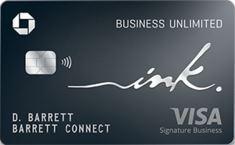Business Credit Cards: How to Get One in 5 Simple Steps

Our evaluations and opinions are not influenced by our advertising relationships, but we may earn a commission from our partners’ links. This content is created by TIME Stamped, under TIME’s direction and produced in accordance with TIME’s editorial guidelines and overseen by TIME’s editorial staff. Learn more about it.
Having access to credit is monumentally important to a small business, especially when you’re just starting out. According to the Small Business Administration (SBA), using a business credit card is one of the fastest ways to build credit history for your business. With a strong credit history, you’ll get more favorable terms and rates, as well as the opportunity to grow your business.

Introductory Offer:
Card Rewards:
Additional Benefits:
Member FDIC
There are some compelling reasons why a business credit card makes sense. This is what one can do for your business:
If this is your first business credit card, it’s helpful to know what’s required before you apply for one.
You may qualify for a business credit card and not realize it. If you sell on Etsy or at the local farmer’s market, you qualify. If you tutor part time, deliver groceries, or drive for a ride-sharing company, you qualify. If you freelance as a graphic designer, writer, or web designer, you qualify.
Other, traditional business structures that may qualify include:
Your personal credit will be evaluated to qualify you for a business card, even if you apply with an employer identification number (EIN). This is especially true of new businesses that do not have a credit history. A good personal credit score is a great way to help you get one of the best small business credit cards.
Lenders look for a business with solid financials. They’ll look at how much money your business makes as well as how much money you have in your bank account.
Surprising things you don’t need include:
If you think you’re ready to take the leap and apply for a business credit card, there are five steps you need to take.
Before you apply for a credit card, check to see if there’s anything in your credit report that can be improved. Unless you qualify for a corporate credit card where you apply only with an EIN (more on this later), your personal credit information will affect your business application. Cleaning up your personal credit score will go a long way toward earning you the best rates and terms so you can get one of the best credit cards.
Choosing the best business credit card takes a little bit of research. There are many choices for business credit cards, with different qualifications and features.
Some factors you may want to consider when it comes to a business credit card include:
Popular small business credit cards you’ll come across in your research may include:

Introductory Offer:
Card Rewards:
Additional Benefits:
Member FDIC
After you have an idea of which credit card you want, applying is simply a matter of submitting your information to the credit card issuer. Collecting it ahead of time will make your application go quickly. This includes:
Once you have all your information, you’re ready to apply. Online applications are pretty simple and usually take less than 10 minutes.
You’ll often see a decision immediately. If you were not approved, you do have the option of calling the reconsideration line.
Your card will arrive in the mail in about a week. You can start charging appropriate business purchases on the card immediately.
As a small business owner, you can apply for a business credit card either with an EIN or your Social Security number, but there are some tricky details to keep in mind when you apply.
When you apply for a business credit card with an EIN, you’ll also be asked for your personal information—but that can be a good thing. Your personal credit score and income can help you qualify for a business credit card.
Qualifying for a credit card on an EIN alone has some stringent requirements. You’ll need to have:
You don’t need an EIN to apply for a business credit card—your Social Security number will work. However, if you want to use a separate EIN for your business, you may be able to get one in a matter of minutes by applying online through the IRS.
Business credit cards aren’t the only way to fund your business. You may also want to look into the following options.
You may be able to qualify for an SBA loan, which is a business loan guaranteed by the U.S. Small Business Administration. The loans are made with a lending partner of the SBA and can range from $500 to $5.5 million. Your business must meet SBA size requirements, have sound financials, and be able to repay the loan.
With a business line of credit, you can borrow the amount of money you need up to a limit (much like a credit card). It provides a lot of flexibility for your money and you only pay interest on what you borrow.
Also called a merchant cash advance, a business can trade a percentage of its future credit-card sales in exchange for a lump sum to help fund business operations. Businesses make this loan with a lender who specializes in this type of transaction, and the fees can be high.
Many new business owners tap the equity in their home to fund their business, either with a home equity line of credit (HELOC) or a home equity loan. It’s a bet on yourself that you can earn enough money with business revenue so you don’t lose your home. If you’re unable to make payments on your home equity loan, the bank could start foreclosure proceedings against you.
Personal loans are more expensive and will likely have a lower amount for which you qualify. However, your home is not at risk if you default on the loan. There’s no shortage of lenders who offer personal loans, including some you may not have considered.
 |  |  | |
|---|---|---|---|
| APR | 7.99% to 35.99% | 9.99% to 35.99% | 7.80% to 35.99% |
| Loan amount | $1,000 to $36,500 | $1,000 to $50,000 | $1,000 to $50,000 |
| Min. credit score | 600 | 580 | 300 |
The requirements for getting a business credit card aren’t as stringent as you think. You don’t need an EIN or a legal business structure to qualify. The main requirement is that you have a business and use the card for your business.
You can pick from some of the best small business credit cards to get started with building your business credit score, separating your business expenses from your personal expenses, and earning rewards on your business expenses. There’s a lot of value you can derive as a business owner from a good business credit card.
Business credit cards work like regular credit cards. The main difference is a business credit card is for business expenses only.
The best small business card is the card that works best for your business needs. Consider which features you need or what rewards you want to earn.
With a bad personal credit score, your odds of being approved for many business cards is low, but never zero. You may be approved for a lower limit or at a higher interest rate than you want. You also may want to look for a secured credit card or issuers that specialize in cards for those with poor credit.
The information presented here is created by TIME Stamped and overseen by TIME editorial staff. To learn more, see our About Us page.




